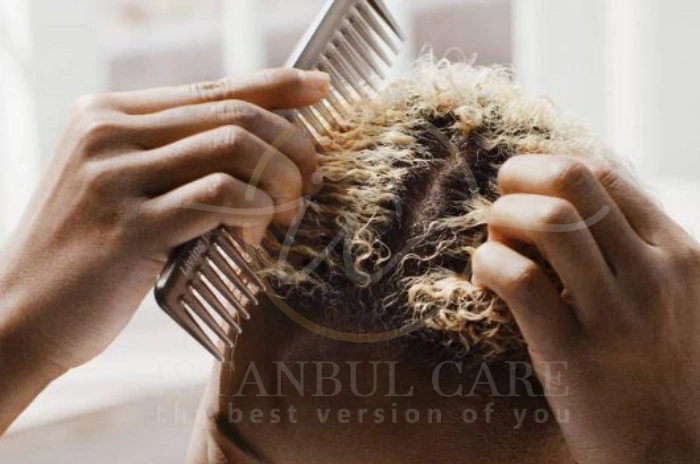A healthy scalp is the foundation of beautiful hair, yet many people struggle with dry scalp conditions that can cause discomfort and embarrassment, making dry scalp medications an important part of relief. Understanding the root causes and effective treatments for dry scalp can help you achieve lasting relief and maintain optimal scalp health. This comprehensive guide explores everything you need to know about identifying, treating, and preventing dry scalp issues.
What dry scalp is and common signs
Dry scalp occurs when your scalp lacks sufficient moisture and natural oils to maintain healthy skin. Unlike other scalp conditions, dry scalp specifically refers to skin that has become dehydrated and irritated due to various environmental and lifestyle factors.
The most common signs of dry scalp include persistent itching that worsens throughout the day. You may notice small, white flakes that fall from your hair when you scratch or brush it. These flakes typically appear dry and powdery, unlike the oily flakes associated with other scalp conditions.
People with dry scalp often experience tightness or discomfort across their scalp, particularly after washing their hair. The scalp may appear red or irritated in certain areas, especially where scratching has occurred. Some individuals notice that their hair feels brittle or lacks its usual shine and softness.
Dry scalp symptoms tend to worsen during colder months when indoor heating reduces humidity levels. The condition can affect anyone, but it's particularly common among people with naturally dry skin or those who use harsh hair care products regularly.
Dry scalp vs dandruff key differences
Understanding the difference between dry scalp vs dandruff is crucial for choosing the right treatment approach. While both conditions can cause flaking and itching, they have distinct characteristics and underlying causes that require different management strategies.
Dry scalp produces small, white, powdery flakes that fall easily from the hair. These flakes result from dehydrated skin cells that shed more rapidly than normal. The scalp often feels tight and uncomfortable, particularly after washing with harsh shampoos or exposure to dry air.
Dandruff, on the other hand, creates larger, oily, yellowish flakes that tend to stick to the hair and scalp. This condition stems from an overgrowth of yeast called Malassezia, which feeds on scalp oils and causes inflammation. Dandruff flakes have a greasy texture and may have a slight odor.
The dry scalp vs dandruff distinction also extends to associated symptoms. Dry scalp typically causes mild to moderate itching that improves with moisturizing treatments. Dandruff often produces more intense itching and may be accompanied by redness and inflammation that doesn't respond well to simple moisturizing.
Treatment approaches differ significantly between these conditions. Dry scalp responds best to gentle, moisturizing products and lifestyle changes. Dandruff requires specialized antifungal treatments and medicated shampoos to address the underlying yeast overgrowth.
Main causes of dry scalp products weather and age
Several factors contribute to what causes dry scalp, ranging from environmental conditions to personal care choices. Understanding these causes helps you make informed decisions about prevention and treatment strategies.
Weather conditions play a significant role in dry scalp development. Cold winter air contains less moisture, while indoor heating systems further reduce humidity levels in your living and working spaces. This combination creates an environment where your scalp loses moisture more rapidly than it can be replenished naturally.
Hair care products often contribute to dry scalp issues. Many commercial shampoos contain sulfates and other harsh chemicals that strip natural oils from your scalp. Fragrance free shampoo options are often gentler and less likely to cause irritation. Additionally, frequent use of heat styling tools can damage both hair and scalp.
Age naturally affects scalp moisture levels. As we get older, our skin produces less sebum, the natural oil that keeps our scalp hydrated. This reduction in oil production makes older adults more susceptible to dry scalp conditions.
Other contributing factors include certain medications that can reduce oil production, medical conditions like eczema or psoriasis, and lifestyle choices such as inadequate water intake. Avoid harsh hair products that contain alcohol or strong detergents, as these can worsen dry scalp symptoms.
Hot water temperatures during hair washing can also strip essential oils from your scalp. Learning to wash hair with warm water instead of hot water helps preserve your scalp's natural moisture barrier.
Building a Healthy Scalp Care Routine
Establishing a consistent scalp care routine forms the foundation of effective dry scalp treatment. A well-designed routine addresses both immediate symptoms and long-term scalp health to prevent future issues.
Start your scalp care routine by choosing gentle, moisturizing hair care products. Look for shampoos specifically formulated for dry or sensitive scalps, and always opt for fragrance free shampoo options when possible. These products clean your hair without stripping essential oils from your scalp.
Frequency of washing plays a crucial role in maintaining scalp health. Most people with dry scalp benefit from washing their hair every other day or even less frequently. Over-washing can worsen dryness by removing too many natural oils.
When you do wash your hair, always wash hair with warm water rather than hot water. Hot water can damage your scalp's protective barrier and increase moisture loss. Follow up with a lukewarm rinse to help seal the hair cuticles and lock in moisture.
Incorporate scalp massage into your routine to stimulate blood circulation and distribute natural oils. Spend a few minutes gently massaging your scalp with your fingertips during shampooing or while applying treatments.
Consider the environment where you spend most of your time. Avoid indoor heating when possible, or use a humidifier to add moisture to dry air. This simple step can significantly improve your scalp's comfort level during winter months.
The Best Products for Scalp Care and Hydration
Selecting the right products is essential for effective dry scalp treatment. The best shampoo for dry scalp should cleanse gently while providing moisture and nourishment to your scalp.
Look for shampoos containing ingredients like ceramides, hyaluronic acid, or glycerin, which help attract and retain moisture. Natural oils such as argan, jojoba, or coconut oil can provide additional hydration without weighing down your hair.
Fragrance free shampoo formulations reduce the risk of allergic reactions and irritation. Many people find that unscented products are gentler on sensitive scalps and less likely to cause inflammation or worsen existing dry scalp symptoms.
Conditioners designed for dry scalp often contain additional moisturizing ingredients. Apply conditioner primarily to the mid-lengths and ends of your hair, but don't avoid the scalp entirely. A small amount worked gently into the scalp can provide beneficial hydration.
Leave-in treatments and scalp serums offer targeted relief for persistent dry scalp issues. These products typically contain concentrated moisturizing ingredients that can be applied directly to problem areas between washes.
Consider rotating between different products to prevent your scalp from becoming too accustomed to any single formula. This approach can help maintain the effectiveness of your scalp care routine over time.
Effective Dry Scalp Treatment Options
Professional dry scalp treatment options range from over-the-counter products to prescription medications, depending on the severity of your condition. Understanding these options helps you choose the most appropriate approach for your specific needs.
Topical treatments form the first line of defense against dry scalp. Moisturizing scalp treatments containing ingredients like urea, lactic acid, or salicylic acid can help remove dead skin cells while providing hydration. These treatments are typically applied to the scalp and left on for specified periods before rinsing.
Home remedies for dry scalp can provide natural relief for mild to moderate symptoms. Natural oils such as coconut, olive, or jojoba oil can be massaged into the scalp and left overnight before washing out with a gentle shampoo.
Tea tree oil, when properly diluted, offers antimicrobial properties that can soothe irritated scalp tissue. However, always test a small area first, as some people may be sensitive to essential oils.
Aloe vera gel provides cooling relief and natural moisturizing properties. Apply pure aloe vera gel directly to clean, dry scalp areas and leave on for 15-20 minutes before rinsing with cool water.
For persistent or severe dry scalp conditions, consulting a dermatologist may be necessary. They can prescribe medicated shampoos or topical treatments that aren't available over-the-counter.
Dry scalp vs dandruff differences and why they matter
The distinction between dry scalp vs dandruff extends beyond simple identification – it fundamentally affects your treatment approach and long-term scalp health outcomes. Misidentifying your condition can lead to ineffective treatments that may actually worsen your symptoms.
| Feature | Dry Scalp | Dandruff |
|---|---|---|
| Flake Size | Small, fine flakes | Large, thick flakes |
| Flake Color | White, powdery | Yellow or white with oily appearance |
| Flake Texture | Dry and light | Oily and sticky |
| Scalp Feel | Tight and uncomfortable | Itchy with mild irritation |
| Underlying Cause | Lack of moisture | Malassezia yeast overgrowth |
| Best Treatment | Moisturizing products | Antifungal shampoos |
| Response to Oils | Improves with natural oils | May worsen with heavy oils |
| Seasonal Pattern | Worse in winter/dry weather | Consistent year-round |
Dry scalp requires gentle, moisturizing approaches that focus on restoring hydration and protecting the scalp's natural barrier. Using anti-dandruff products on dry scalp can be counterproductive, as these formulations often contain ingredients that further dry out the scalp.
Dandruff treatment typically involves antifungal ingredients like ketoconazole, selenium sulfide, or zinc pyrithione. These active ingredients target the yeast overgrowth that causes dandruff but can be too harsh for someone dealing with simple dry scalp issues.
The dry scalp vs dandruff distinction also matters for prevention strategies. Dry scalp prevention focuses on maintaining moisture levels through environmental controls, gentle products, and adequate hydration. Dandruff prevention often involves managing oil production and controlling fungal growth.
Long-term outcomes differ significantly between these conditions. Dry scalp often responds well to consistent moisturizing routines and lifestyle adjustments. Dandruff may require ongoing management with specialized products to prevent recurrence.
Lifestyle factors that help with dry scalp include ensuring you drink more water for skin health, maintaining appropriate humidity levels in your environment, and avoiding products that strip natural oils. These same strategies may not be as effective for dandruff management.
Understanding when to see a doctor for dry scalp is important for both conditions. If your symptoms persist despite consistent treatment, worsen over time, or are accompanied by significant inflammation or hair loss, professional evaluation is recommended.
We’re ready to answer your questions
Dry scalp produces small, white, powdery flakes from dehydrated skin, while dandruff creates larger, oily, yellowish flakes caused by yeast overgrowth.
Dry scalp is primarily caused by cold weather, indoor heating, harsh hair products, aging, and insufficient moisture in your environment.
Moisturize dry scalp by using gentle, fragrance free shampoo, applying natural oils, using a humidifier, and ensuring you drink more water for skin health.
The best shampoo for dry scalp contains moisturizing ingredients like ceramides or natural oils, is fragrance free, and cleanses gently without stripping natural oils.
Follow us on social media for updates, tips, and patient success stories:

